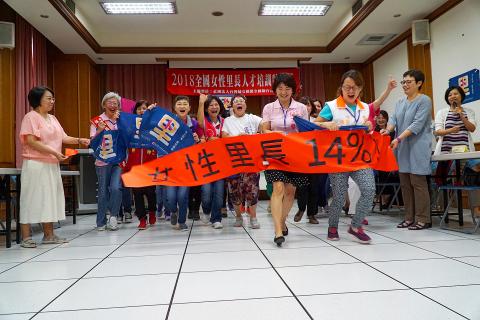Women’s groups yesterday said they hope that more women would be elected as borough and village wardens at the nine-in-one local elections on Nov. 24.
Women hold about 14 percent of the nation’s 7,000 borough and village warden positions, the National Alliance of Taiwan Women’s Associations told a news conference in New Taipei City’s Banciao District (板橋).
This is despite the nation having already elected its first female president, while about 38 percent of legislators and one-quarter of city and county councilors are women, alliance chairperson Chen Hsiu-hui (陳秀惠) said.

Photo: CNA
Although the majority of community service and volunteer work is performed by women, they are often hesitant to vie for leadership roles, Chen said.
The alliance encourages women in local communities to run for borough or village warden, and groups are there to offer support, she said.
The alliance said it held training sessions in July and last month throughout the nation for potential female warden candidates to increase the proportion of female leaders and in local communities and to support them.
This month, it hosted training sessions for female candidates, it said.
The alliance said it hopes that the proportion of female wardens would surpass 14 percent after the elections on Nov. 24, while it aims to reach 20 percent.
Chen said she hopes that once female wardens are elected, they would transcend party lines and act as professional community workers and managers.
They would bring the values of social welfare and civil groups into their communities and create environments that are more friendly and livable, Chen said.
At the news conference, female candidates across the nation broke through a banner that said: “Female borough wardens, 14 percent.”
Several women’s groups, including the Homemakers United Foundation, the Peng Wan-ru Foundation, the Taipei Women’s Rescue Foundation, the Awakening Foundation, the Society of Taiwan Women in Science and Technology, the Taipei Awakening Association and the Kaohsiung Women Awakening Association, also attended the event.

Chinese spouse and influencer Guan Guan’s (關關) residency permit has been revoked for repeatedly posting pro-China videos that threaten national security, the National Immigration Agency confirmed today. Guan Guan has said many controversial statements in her videos posted to Douyin (抖音), including “the red flag will soon be painted all over Taiwan” and “Taiwan is an inseparable part of China,” and expressing hope for expedited reunification. The agency last year received multiple reports alleging that Guan Guan had advocated for armed reunification. After verifying the reports, the agency last month issued a notice requiring her to appear and explain her actions. Guan

GIVE AND TAKE: Blood demand continues to rise each year, while fewer young donors are available due to the nation’s falling birthrate, a doctor said Blood donors can redeem points earned from donations to obtain limited edition Formosan black bear travel mugs, the Kaohsiung Blood Center said yesterday, as it announced a goal of stocking 20,000 units of blood prior to the Lunar New Year. The last month of the lunar year is National Blood Donation Month, when local centers seek to stockpile blood for use during the Lunar New Year holiday. The blood demand in southern Taiwan — including Tainan and Kaohsiung, as well as Chiayi, Pingtung, Penghu and Taitung counties — is about 2,000 units per day, the center said. The donation campaign aims to boost

The Kaohsiung Tourism Bureau audited six hotels in an effort to prevent price gouging ahead of Korean band BTS’ concert tour in the city scheduled for Nov. 19, 21 and 22 this year. The bureau on Friday said that the audits — conducted in response to allegations of unfair pricing posted on social media — found no wrongdoing. These establishments included the local branches of Chateau de Chine, Hotel Nikko, My Humble House, and Grand Hai Lai, it said, adding that the Consumer Protection Commission would have penalized price gougers had the accusations been substantiated. The bureau said the Tourism Development Act

The Central Weather Administration (CWA) said a magnitude 4.9 earthquake that struck off the coast of eastern Taiwan yesterday was an independent event and part of a stress-adjustment process. The earthquake occurred at 4:47pm, with its epicenter at sea about 45.4km south of Yilan County Hall at a depth of 5.9km, the CWA said. The quake's intensity, which gauges the actual effects of a temblor, was highest in several townships in Yilan and neighboring Hualien County, where it measured 4 on Taiwan's seven-tier intensity scale, the CWA said. Lin Po-yu (林柏佑), a division chief at the CWA's Seismological Center, told a news conference